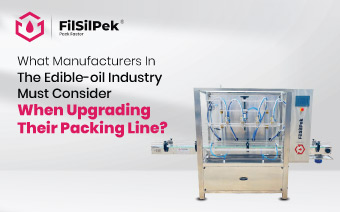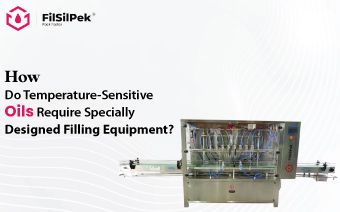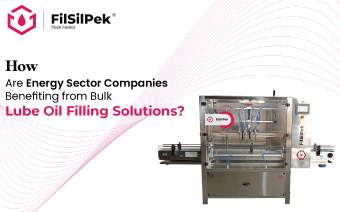How Edible Oil Filling Machines Support Large-Scale Operations in the FMCG Sector?
Edible oil production in the FMCG sector demands high throughput, precision, and compliance with food safety regulations. Large-scale manufacturers rely on automated filling systems designed to handle diverse oil viscosities while ensuring accuracy and minimal wastage. These machines integrate advanced metering technologies, servo-driven controls, and hygienic design principles to optimize production efficiency.
Traditional manual or semi-automated filling methods cannot meet the stringent requirements of mass production. Modern edible oil filling machines incorporate programmable logic controllers (PLCs), automated cleaning mechanisms, and high-speed filling heads to maintain uniform output, reduce downtime, and ensure compliance with industry standards.
Challenges in Large-Scale Edible Oil Production
Manufacturers dealing with bulk edible oil production face multiple operational and technical challenges, including:
- High-Speed Production Requirements: Large-scale facilities must process thousands of bottles per hour with minimal deviation.
- Viscosity Variations: Different edible oils, such as soybean, palm, and olive oil, exhibit varying flow characteristics that require adaptable filling mechanisms.
- Precision and Waste Reduction: Overfilling leads to financial loss, while underfilling results in regulatory non-compliance.
- Stringent Hygiene and Safety Standards: Machines must comply with food-grade material requirements and prevent microbial contamination.
- Integration with Existing Production Lines: Seamless synchronization with capping, labeling, and packaging systems is essential for efficient workflow.
How Edible Oil Filling Machines Address These Challenges?
1. Flow Meter and Piston-Based Filling for Accuracy
Edible oil filling machines use advanced metering systems such as:
- Mass Flow Meters: Ideal for high-accuracy filling, using Coriolis or electromagnetic sensors to measure oil density and volume in real time.
- Piston Fillers: Designed for consistent volume-based filling, particularly useful for thicker oils that require controlled displacement.
- Gravity and Overflow Fillers: Suitable for thin edible oils, leveraging gravity-assisted filling for precise level control.
Each system ensures consistency across production batches, reducing wastage and improving regulatory compliance.
2. Servo-Driven Nozzle Control for Variable Viscosity Handling
Viscosity fluctuations impact flow rates, requiring dynamic adjustments in filling speed and nozzle operation. Servo-driven controls allow:
- Adjustable Fill Speeds: Real-time adjustments based on oil thickness and ambient temperature variations.
- No Drip, Anti-Foaming Nozzles: Prevent air bubbles and spillage, enhancing product presentation.
- Multi-Stage Filling: Initial high-speed bulk fill followed by slow-finish precision fill to minimize overflow.
3. Automated CIP (Clean-in-Place) and SIP (Sterilization-in-Place) Systems
Hygiene is critical in edible oil packaging to prevent microbial contamination and rancidity. Advanced machines integrate:
- CIP Systems: Circulate cleaning agents through the filling lines without disassembly, ensuring rapid sanitation.
- SIP Systems: Utilize steam or chemical sterilization for aseptic processing, reducing cross-contamination risks.
- Stainless Steel Contact Parts: Grade 316L materials resistant to corrosion and oil residues.
4. PLC-Based Synchronization with Capping and Packaging
Modern edible oil filling machines operate as part of a fully automated production line, integrating with:
- Automatic Capping Units: Ensures secure sealing with torque-controlled screw caps or induction seals.
- Inline Weighing Systems: Real-time verification of filled weights, triggering automatic rejection of non-conforming bottles.
- Conveyor-Based Smart Labeling: Synchronizes with bottle movement for high-speed application of product labels and batch codes.
5. Scalability and Multi-Format Bottle Handling
Large-scale FMCG manufacturers require flexibility to handle different packaging formats. Advanced filling machines offer:
- Quick Changeover Mechanisms: Tool-free adjustments for different bottle sizes and shapes.
- Multi-Head Filling Configurations: Customizable setups with up to 20+ nozzles for high-speed production.
- Integrated Quality Control Sensors: Optical and weight-based detection systems to ensure uniform filling.
Putting it together
Edible oil filling machines are an integral component of large-scale FMCG production, offering high-speed, precise, and hygienic filling solutions. With advanced metering technologies, servo-driven controls, and CIP/SIP integration, these machines optimize efficiency while maintaining compliance with industry standards. As demand grows, automation will continue to drive operational scalability and cost efficiency in edible oil manufacturing.
Would you like additional insights on any specific technical aspect? – Feel free to drop us a line at [email protected]
What Manufacturers in the Edible-Oil Industry Must Consider When Upgrading Their Packing Line?
Upgrading the packing line doesn’t mean getting newer machine…
How Do Temperature-Sensitive Oils Require Specially Designed Filling Equipment?
Temperature-sensitive oils—such as coconut oil, shea butter oil, certain medicinal oils, and some industrial-grade..
How Are Energy Sector Companies Benefiting from Bulk Lube Oil Filling Solutions?
The energy sector, spanning oil and gas, power generation, and renewable energy, is one of the most crucial industries globally..



